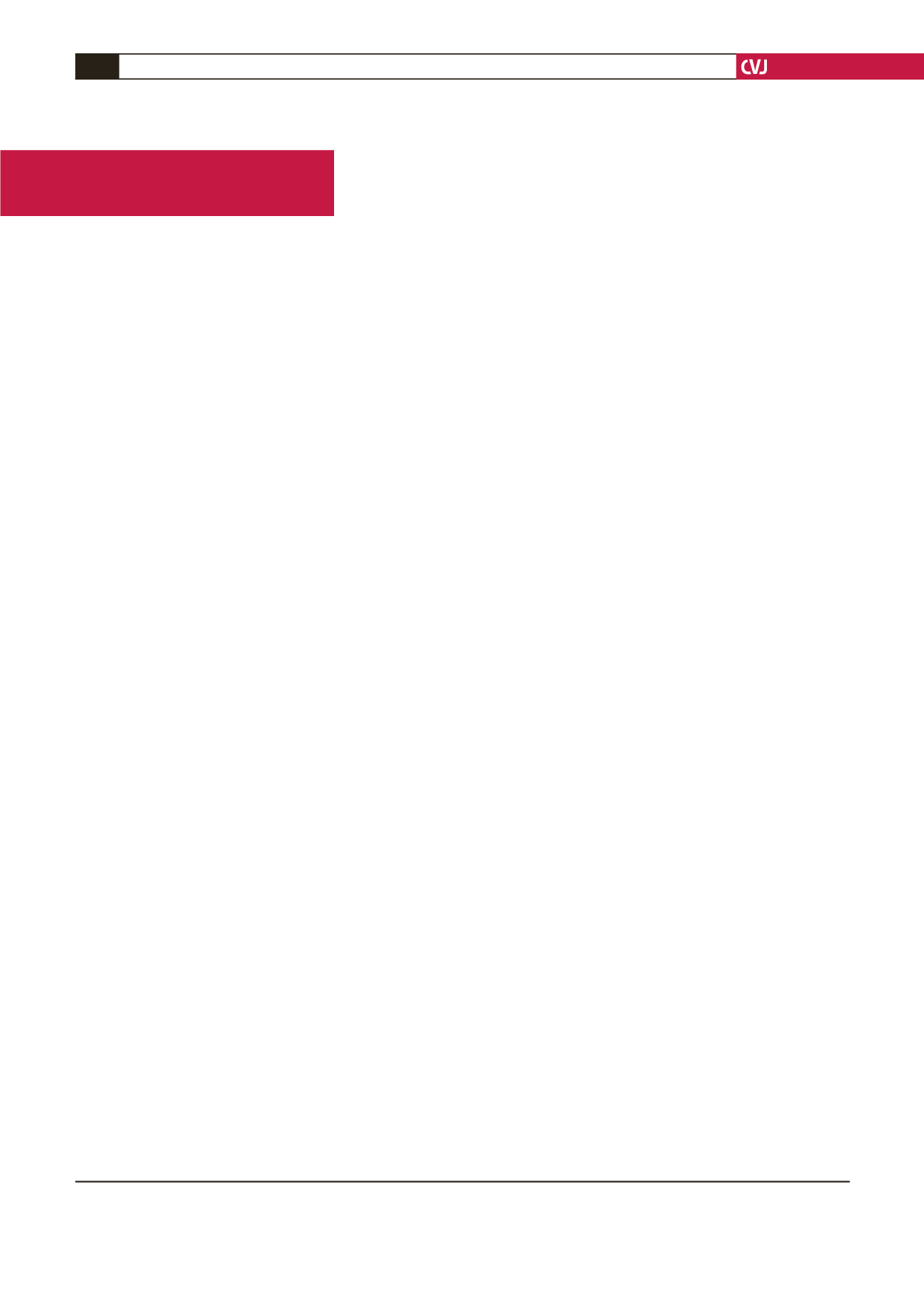

CARDIOVASCULAR JOURNAL OF AFRICA • Volume 29, No 6, November/December 2018
404
AFRICA
News from the 2018 Cape Town World Congress of
Internal Medicine
Why hypertension matters: the silent killer
Launching the 2018 World Congress of Internal Medicine
(WCIM), the South African Hypertension Society (SAHS)
hosted a media brief on the importance and urgency of
detection and management of hypertension. ‘Findings from
global and South African cohorts show critically low awareness
of hypertension...’ This message from Dr Martin Mpe, president
of the SAHS, underscores the fact that hypertension is the
most important preventable cause of morbidity and mortality
worldwide.
1
The importance of blood pressure as a risk factor for
cardiovascular disease is long recognised. Hypertension is
causally linked to stroke, myocardial infarction, end-stage kidney
disease, congestive heart failure, peripheral vascular disease and
blindness. Inadequate control of blood pressure is responsible
for 60% of strokes globally and 30% of ischaemic heart disease.
1
Hypertension is also related to dementia and sexual dysfunction.
Treatment adherence (medicine, diet, lifestyle) to control
hypertension is crucial and Dr Mpe noted that ‘...poor adherence
is of no benefit and is the same as doing nothing,’ with only
one-third of treated patients achieving target. It is, however,
problematic that the target population that should benefit from
advances in hypertension treatment are not even aware of their
blood pressure levels.
There are no symptoms of hypertension, ‘the silent killer’, and
this can hinder diagnosis. Sub-Saharan Africa has a burden of
73% undiagnosed hypertension.
1
In 2010, 40% of South African
adults older than 25 years showed measured hypertension.
2
South African demographic and health survey figures from 2016
indicate a prevalence of hypertension of 46% in women and 44%
in men older than 15 years.
3
Awareness is the gateway to improved blood pressure control.
The International Hypertension Society (IHS) introduced
May Measurement Month in 2017, to raise awareness of the
importance of measuring blood pressure. Prof Alta Schutte,
president of the IHS, elaborated on the survey outcomes. Of
1.5 million people screened from 89 countries (including South
Africa) during May 2018, 18.4% were found to have high blood
pressure that was untreated, and 40.4% of those on treatment
were not controlled to target (unpublished data). South African
data from the 2017 survey shows that 56% of those on treatment
are not adequately controlled.
4
Our older population
While increasing age is a risk factor for hypertension, andalthough
the size of the older population is increasing, relative global
prevalence of hypertension continues to climb. Prof Neil Poulter,
Oxford, UK, points out that lifestyle is key in the prevention and
management of hypertension. As populations develop, there is a
shift in lifestyle towards reduced physical activity, an increase in
alcohol and tobacco consumption, unhealthy eating habits, using
too much salt and being overweight, all of which are risk factors
for hypertension.
5
With 1.56 billion people predicted to have hypertension
by 2025, the urgency to detect and manage this condition is
paramount for non-communicable disease management. Prof
Brian Rayner, Hypertension Institute, UCT, recommends that
individuals be encouraged to know their own blood pressure
numbers. Blood pressure monitoring is a simple procedure,
using many validated devices available on the market. Servier
Pharmaceuticals sponsored the May Hypertension Awareness
campaign and an educational video for patients and practitioners
on how to correctly measure blood pressure.
References
1.
Chow CK, Teo KK, Rangarajan S,
et al.
Prevalence, awareness, treatment,
and control of hypertension in rural and urban communities in high-,
middle-, and low-income countries.
J AmMed Assoc
2013;
310
(9): 959–968.
2.
Day C, Groenewald P, Laubscher R,
et al.
Monitoring of non-commu-
nicable diseases such as hypertension in South Africa: Challenges for
the post-2015 global development agenda.
S Afr Med J
2014;
104
(10):
680–687.
3.
National Department of Health, Statistics South Africa, South African
Medical Research Council.
South Africa demographic and health survey
2016: Key indicators.
https://www.statssa.gov.za/publications/Report%2003-00-09/Report%2003-00-092016.pdf.
4.
Beaney T, Schutte A, Tomaszewski M,
et al.
May Measurement Month
2017: an analysis of blood pressure screening results worldwide.
Lancet
Glob Health
2018;
6
(7): e736–e743.
5.
Poulter NR, Prabhakaran D, Caulfield M. Hypertension.
Lancet
2015;
386
(9995): 801–812.
Source: deNovo Medica
www.denovomedica.comCardio News

















